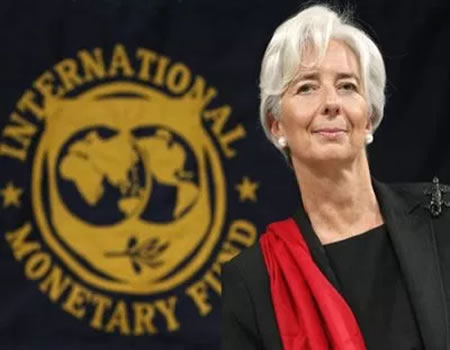This was contained in a statement released by an IMF team that was in Nigeria between December 6-20, 2017 to conduct the 2018 Article IV consultation.
The team, led by Amine Mati, Senior Resident Representative and Mission Chief for Nigeria at the IMF, stated that “Overall growth is slowly picking up but recovery remains challenging. Economic activity expanded by 1.4 per cent year-on-year in the third quarter of 2017—the second consecutive quarter of positive growth after five quarters of recession—driven by recovering oil production and agriculture.”
The statement noted, however, that growth in the non-oil-non-agricultural sector (representing about 65 per cent of the economy), contracted in the first three quarters of 2017 relative to the same period last year.
“Difficulties in accessing financing and high inflation continued to weigh on companies’ performance and consumer demand. Headline inflation declined to 15.9 per cent by end-November, from 18½ per cent at end-2016, but remains sticky despite tight liquidity conditions.
“High fiscal deficits—driven by weak revenue mobilization—generated large financing needs, which, when combined with tight monetary policy necessary to reduce inflationary pressures, increased pressure on bond yields and crowded out private sector credit.”
According to the team, “These factors contributed to raising the ratio of interest payments to federal government revenue to unsustainable levels. Reflecting the low growth environment and exposure to the oil and gas sector, the banking industry’s solvency ratios have declined from almost 15 to 10½ per cent between December 2016 and October 2017, and non-performing loans have increased from 5 per cent in June 2015 to 15 percent as of October 2017, although with provisioning coverage of about 82 per cent.”
While noting that the economy would continue on the path of growth in 2018, it expressed concern over the absence of appropriate policies that could drive the growth.
“In the absence of new policies, the near-term outlook remains challenging. Growth is expected to continue to pick up in 2018 to 2.1 per cent, helped by the full year impact of greater availability of foreign exchange and higher oil production, but to stay relatively flat in the medium term. Risks to the outlook include lower oil prices, tighter external market conditions, heightened security issues, and delayed policy responses.”
It added that neither poverty nor junemployment could be reduced without appropriate policies.
While commending the government for the recent reforms targeted at improving tax administration, it noted that, “With oil prices expected to remain lower than in the past, upfront actions to mobilize non-oil revenues, including through reforming the VAT and removing exemptions, are needed while safeguarding priority expenditures, including scaling up social safety nets and infrastructure investment.
“Fiscal consolidation should be accompanied by a monetary policy stance that remains tight to further reduce inflation and anchor inflation expectations. Moving toward a unified and market-based exchange rate as soon as possible while continuing to strengthen external buffers would be necessary to increase confidence and reduce potential risks from capital flow reversals.
“Such a policy package—along with structural reform implementation, including by building on recent successes to improve the business environment, closing infrastructure gaps, and implementing the power sector reform plan——would lay the foundation for a diversified private-sector led economy. Strengthening governance and transparency initiatives, and lowering gender inequality and fostering financial inclusion would also be important.”
The IMF team commended the Federal Government for addressing macroeconomic imbalances and structural impediments through the implementation of policies underpinning the Economic Recovery and Growth Plan (ERGP).
In its comments on the country’s foreign exchange policy, IMF noted that with increased revenue from crude oil, “The new investor and exporter foreign exchange window has increased investor confidence and provided impetus to portfolio inflows, which have helped to increase external buffers to a four-year high, and contributed to reducing the parallel market premium.”
The team also noted that the actions taken under the Power Sector Recovery Program increased power supply generation and ensured government agencies pay their electricity bills.
“Welcome steps were also taken to improve the business environment and to address longstanding corruption issues, including through the adoption of the National Anti-Corruption Strategy in August 2017,” the IMF team stated.






